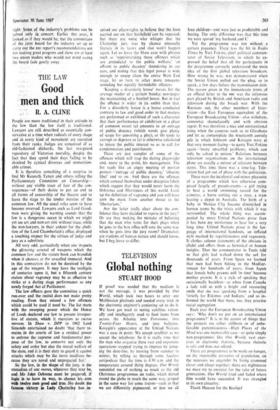Global nothing
TELEVISION STUART HOOD
If proof was needed that the medium is not the message, it was provided by Our World, which took two hours to utter one Malthusian platitude and needed every trick in the electronic engineer's conjuring set to do it. We have got used to seeing satellites ration- ally and intelligently used to feed items from across the Atlantic into Panorama, into Twenty-Four Hours, and into bulletins. Kosygin's appearance at the United Nations was a case in point. We accept satellites as we accept the telephone. So it is really time that the men who organise these vast and expensive operations stopped trying to impress by jump- ing the date-line, by moving from summer to winter, by telling us through some faceless antipodean that the time is 4.30 a.m. and the temperature around thirty degrees. Our World reminded me of nothing so much as the old Christmas programmes on radio, which darted round the globe in much the same way, groped in the same way for some truism—such as that we are differently pigmented, or that we all
love children---and were just as predictable and boring. The only difference was that this time we were spared 'my husband and I.'
Yet the programme was not witho.ut.a certain piquancy. There 4vas the bit in Radio Times by Yuri Fokine, chief political commen- tator of Soviet Television, in which he ex- pressed the belief that all the participants in the programme correctly understood the main idea of the first global television broadcast. How wrong he was, was demonstrated when the Soviet Union pulled out the -plug, so to speak, a few days before the transmission date. The reason given in the immoderate terms of an official letter to the B BC was the infamous part played by British and American radio and television during the Israeli war. With the Russians out, the other members of Inter- vision—the East European equivalent of the European Broadcasting Union—also withdrew, somewhat shamefacedly and with obvious regret. It was therefore a nice and unintentional irony when the cameras took us to Glassboro and let us contemplate the nineteenth century pile in which Johnson and Kosygin were at that very moment facing—to quote Yuri Fokine again—'many unsettled problem,, which can only be solved in unison.' Relations between television organisations on the international plane are usually a mirror of relations between states. This time there was a time-lag. Tele- vision had got out of phase with the politicians.
These were the incidental and minor pleasures of a programme which was otherwise com- posed largely of pseudo-events—a girl trying to beat a world swimming record for the cameras, a horse cutting out a steer, a tram leaving a depot in Australia. The birth of a baby in Mexico City became diminished in human terms by the trivia with which it was surrounded. The whole thing was accom- panied by more United Nations prose than it has been my misfortune to hear for a very long time. United Nations prose is the lan- guage of international handouts, an inflated style marked by repetitiousness and vagueness. It clothes solemn statements of the obvious in clichd and offers them as historical or human insights. Thus the commentator in Tunis told us that girls had walked down the suk for thousands of years. From Spain we learned that men had been fishing in the Mediter- ranean for hundreds of years: from Japan that female baby prawns will 'in time' become mother prawns. It is a style of speaking that occasionally backfires—as when from Canada a lady told us with a bright and reassuring smile that she was speaking from a hospital 'strictly for Eskimos and Indians,' and so in- formed the world that there, too, they practise racial segregation.
Each year the European Broadcasting Union says: 'Why don't we put on an international programme?' It is in the nature of things that the projects are either stillborn or of unbe- lievable pretentiousness—High Places of the Mind was one memorable case---or quite simply non-programmes like Our World, vast exer- cises in electronic rhetoric, because rhetoric is safe and does not offend.
There are programmes to be made on hunger, on the impossible pressures of population, on the neuroses we engender by living crammed closer and closer together; there are nightmares we must try to exorcise for the sake of future generations. Our World tried and failed where film would have succeeded. It was strangled in its own circuitry.
Thank Heaven for the Beatles!










































 Previous page
Previous page